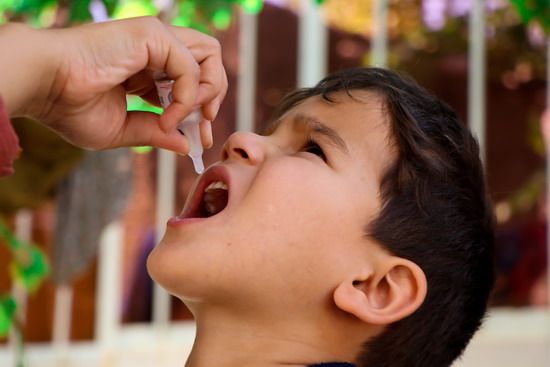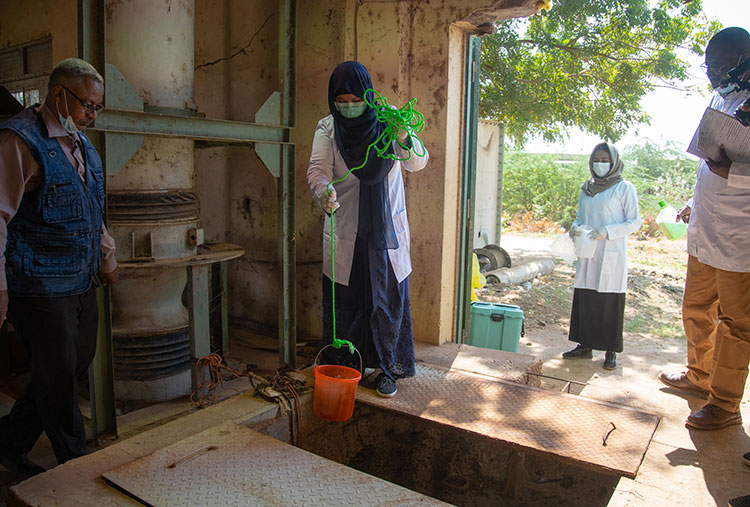Pakistan commended for commitment to eradicating polio
As we begin 2022, we have our best opportunity to end polio for good
Statement by George Laryea-Adjei and Dr Ahmed Al-Mandhari

In June last year, we visited Pakistan, one of two countries in which wild poliovirus is still endemic. Together, we returned to the country in November to witness the impressive progress in Pakistan’s polio programme and its no-holds-barred approach to stopping transmission – progress that has brought about our best opportunity yet to end this disease.
In our roles, we deal with a vast array of health and humanitarian challenges, but few are as close to being solved as polio. As we begin 2022, with only one child paralysed with wild poliovirus in Pakistan last year and four children in neighbouring Afghanistan, we have our best opportunity to end polio for good.
We say this clearly: we have made remarkable progress, but we are not there yet.
To reach the final goal we need the commitment and progress we saw in Pakistan to be sustained until the very end, until transmission is interrupted, and the case number reaches zero.
We need to stop thinking in terms of Pakistan and Afghanistan as two separate challenges. They are one epidemiological block and the two countries must work together to counter this shared threat.
And we need to ensure that quality campaigns on both sides of the Afghanistan-Pakistan border reach every child – because if we are not reaching every child, we are not eradicating polio.
We concluded our second mission in November heartened that Pakistan’s polio programme is fit for purpose in a way it has never been before. Vaccination campaigns have become more precise, operations and monitoring more rigorous and corrective actions timelier and more effective. The recent Independent Surveillance Review reassured us that Pakistan has one of the most developed polio surveillance systems in the world, capable of detecting poliovirus circulation – and it does. Cases of children with flaccid paralysis are reported from across the country. Sewage samples are routinely collected from 65 sites strategically located in 44 districts across the country. What we need to do now is close the gaps on the ground, so this system is even more sensitive to the timely detection of very low levels of poliovirus circulation.
We continue to be impressed by the high level of government leadership and engagement at all levels – from Prime Minister Imran Khan, who chaired a meeting of the National Task Force on Polio Eradication which we attended, to the senior government officials and district commissioners in the key provinces of Sindh, Baluchistan and Khyber Pakhtunkhwa. We commend the Government for confirming that it will continue to contribute funds for the Polio Eradication Programme under a new five-year plan.
Both listening to and engaging with communities, especially in those areas at high risk of polio transmission, is key to finishing the job. We know that some parents don’t have all the information they need to understand that polio is a highly infectious, crippling and sometimes fatal disease that can easily be prevented with oral drops. During our visits, it was inspiring to see frontline teams, the majority of them women, forge new connections with communities, foster local alliances, build and maintain trust in vaccines, and directly engage with the families and caregivers of persistently missed children.
We have long known that the polio programme and its infrastructure are central to public health across the Region, and especially in Pakistan and Afghanistan, where it spearheaded the COVID-19 response. In Peshawar, Karachi and Quetta, we witnessed this first-hand as Pakistan conducted one of the largest vaccination campaigns in history. Nearly 93 million children from 9 months to 15 years were vaccinated against measles and rubella. At the same time, and in close coordination, almost 32 million children were vaccinated against polio. It was a remarkable synergy that called up our shared vision of a polio-free Pakistan and WHO’s regional vision of health for all, by all.
But the three children paralysed with wild poliovirus in northern Afghanistan late last year, and the recent environmental detection of polio in southern Khyber Pakhtunkhwa, are a reminder that this virus does not recognize borders and the two countries must work together to fully capitalize on the current opportunity of low case counts.
Along both sides of the border, a laser focus on core reservoirs and high-risk districts is critical to stopping transmission, and closer coordination on common reservoirs and corridor challenges is a welcome sign. The surveillance review in Pakistan is being complemented by a similar review in Afghanistan, giving us a better indication of gaps and how to address them. The effort to synchronize vaccination activities is an important step forward, one which we expect will have a significant impact.
Restrictions on funding are threatening to severely compromise the health care system and escalating humanitarian needs in Afghanistan where both WHO and UNICEF have taken the responsibility to help sustain the provision of health services, primarily through the Sehatmandi programme. Vaccination activities and surveillance cannot continue if the health system is allowed to collapse.
Together the world has made remarkable progress in eradicating polio, but we are not there yet. As we begin 2022, we will continue to work with the members of the Regional Subcommittee on Polio Eradication, comprising ministers of health from across the Eastern Mediterranean Region, supporting a regional response to a regional problem.
We need extraordinary, widespread urgency from across the Region and the world to push through this last mile. We need political will, funding, and relentless determination from all corners to keep this public health emergency front and centre – until the number of children paralysed with polio reaches zero and stays there.
George Laryea-Adjei is UNICEF Regional Director for South Asia; Dr Ahmed Al-Mandhari is WHO Regional Director for the Eastern Mediterranean.
December polio vaccination begins in Afghanistan
 KABUL, 13 December 2021 - The fourth round of a national polio immunization campaign begins this week (13–16 December 2021), and will be synchronized with Pakistan to improve cross-border polio eradication efforts. The campaign targets 9.9 million children aged 0–59 months across the country and is scheduled to start later this month in some parts of the country, including in the south and east, and in the provinces of Paktia and Ghazni in the south-east, Ghor in the west, and Balkh in the north.
KABUL, 13 December 2021 - The fourth round of a national polio immunization campaign begins this week (13–16 December 2021), and will be synchronized with Pakistan to improve cross-border polio eradication efforts. The campaign targets 9.9 million children aged 0–59 months across the country and is scheduled to start later this month in some parts of the country, including in the south and east, and in the provinces of Paktia and Ghazni in the south-east, Ghor in the west, and Balkh in the north.
Polio eradication within reach in Pakistan
 WHO Regional Director, Dr Ahmed Al-Mandhari, observes polio vaccination in Karachi
WHO Regional Director, Dr Ahmed Al-Mandhari, observes polio vaccination in Karachi
UNICEF and WHO Regional Directors visit the polio-endemic country as efforts to eradicate polio yield crucial progress
ISLAMABAD, Pakistan, 13 December 2021 – UNICEF Regional Director for South Asia, Mr George Laryea-Adjei, and WHO Regional Director for the Eastern Mediterranean, Dr Ahmed Al-Mandhari, recently concluded a visit to Pakistan to support the polio programme as it closes in on the long-sought goal of eradicating polio.
Both Regional Directors said that they continue to be impressed by the high level of government leadership and engagement at all levels – from Prime Minister Imran Khan, who chaired a meeting of the National Task Force on Polio Eradication which the two directors attended, to provincial ministers of health, chief secretaries and district commissioners in the key provinces of Sindh, Baluchistan and Khyber Pakhtunkhwa. Only one child paralyzed by wild poliovirus has been detected in Pakistan in 2021, an impressive result compared to the 306 children with paralytic polio reported in 2014. The polio programme has come a long way since an estimated 20 000 children paralyzed by polio in 1994.
This was Laryea-Adjei’s and Al-Mandhari’s second joint mission to support the polio programme in Pakistan as part of a visit of the Polio Oversight Board, the highest decision-making body in the Global Polio Eradication Initiative. Together with Afghanistan, Pakistan is one of only two remaining countries in the world to still have active wild poliovirus transmission.
The Regional Directors agreed the programme is now at a critical juncture. Noting that that the virus will exploit any weakness, they emphasized the need to reinforce the impressive progress achieved in reducing the number of missed children and vaccine refusals, and to continue targeting high-risk areas, particularly southern Khyber Pakhtunkhwa and those along the border with neighbouring Afghanistan.
The Regional Directors congratulated the Pakistan programme on the results of its recent surveillance review, which found the country’s polio surveillance system to be performing strongly. The review recommended additional measures to further enhance virus detection capacity, particularly in high-risk areas and among high-risk groups. Noting that surveillance was a key driver of eradication efforts, Laryea-Adjei and Al-Mandhari urged the programme to remain hyper vigilant and to continue to search for and encourage the reporting of suspected cases of acute flaccid paralysis (AFP).
Children affected by wild poliovirus recently detected in northern Afghanistan and the recent environmental detection of poliovirus in southern Khyber Pakhtunkhwa in Pakistan serve as a reminder that the polio virus does not recognize borders.
“Afghanistan and Pakistan must work together to fully capitalize on the current opportunity of low numbers of children paralyzed by poliovirus,” said WHO Regional Director, Dr Ahmed Al-Mandhari. “To interrupt transmission, we need both countries to engage bilaterally on this shared threat. Focusing on areas along the border of the two countries, and on mobile and cross-border populations is the key to eradication. The upcoming polio vaccination campaigns must reach all children in both countries.”
The Regional Directors’ visit took place as front-line workers immunized almost 32 million children under-five years of age against polio during a two-week drive coordinated with an historic measles and rubella campaign. Led by Pakistan’s expanded programme on immunization (EPI), the latter reached nearly 93 million children, with support from UNICEF, WHO and Gavi, the Vaccine Alliance. Both Regional Directors encouraged further synergy between the national polio programme and EPI to help protect polio’s gains and keep every child safe from disease.
Laryea-Adjei and Al-Mandhari noted the impressive progress achieved by the integrated services delivery model. Visiting a basic health unit in Quetta, the provincial capital of Balochistan, UNICEF Regional Director, George Laryea-Adjei, said that the units play a crucial role in providing integrated services to vulnerable families living in high-risk districts. Children are not only given polio drops, but also immunized against other preventable diseases as well as provided with screening and treatment for malnutrition, access to safe drinking water and sanitation services, and advice on hygiene, child health care and early childhood development.
The Regional Directors also met with frontline polio workers in Peshawar, Quetta and Karachi. Frontline workers play a critical role in helping to build trust in the vaccines and immunize girls and boys everywhere in Pakistan, including in remote areas and among marginalized communities.
“We remain impressed and inspired by the level of drive, thoroughness and enthusiasm of the Government of Pakistan, the front-line workers and the communities which work to protect every child from this deadly virus,” said Mr Laryea-Adjei as he administered oral polio drops to children at Quetta’s Bolan Medical College Hospital. “Pakistan’s fight against polio has been challenging and enduring. We all need to work together and give a final push so that the number of polio-affected children drops to zero – and stays there.”
While acknowledging the significant progress of the polio programme, Laryea-Adjei and Al-Mandhari emphasised that there is no room for complacency: “The virus is still being detected in environmental samples and further cases can still emerge, so we must be relentless in our efforts in 2022 and beyond.”
 UNICEF Regional Director for South Asia Mr George Laryea-Adjei meets with health workers in Quetta
UNICEF Regional Director for South Asia Mr George Laryea-Adjei meets with health workers in Quetta
Sudan expands environmental surveillance sites to enhance detection of polioviruses
30 November 2021 – Until last year, environmental surveillance for polioviruses in Sudan was confined to Khartoum State, the country’s capital. In the context of a circulating vaccine-derived poliovirus type 2 (cVDPV2) outbreak that has paralysed 58 children, collaboration between Sudan’s Federal Ministry of Health, the National Polio Laboratory and WHO colleagues across the Region has expanded the practice from five sites in this one state, to 14 sites in seven states.
 A Federal Ministry of Health employee collects wastewater samples from one of the environmental surveillance sites in Khartoum
A Federal Ministry of Health employee collects wastewater samples from one of the environmental surveillance sites in Khartoum
Environmental surveillance is the practice of testing sewage runoff for the presence of viruses and other pathogens. Depending on the immunity levels of children in any given community, poliovirus can circulate for a long time without paralysing a child, making environmental surveillance one of the Global Polio Eradication Initiative’s most important surveillance tools.
Sudan’s environmental surveillance expansion plan has brought the practice to West Darfur, North Darfur, East Darfur, Red Sea, White Nile and Gezira states – all areas with frequent mass population movement. With polio outbreaks in multiple neighbouring countries, it is crucial to enhance the surveillance measures in place to detect any importation and respond to it as quickly as possible.
 Between one and two litres of sewage runoff is poured into a labelled jerrycan. It is then sealed, wiped down and transported to the National Polio Laboratory in reverse cold chain
Between one and two litres of sewage runoff is poured into a labelled jerrycan. It is then sealed, wiped down and transported to the National Polio Laboratory in reverse cold chain
In the first half of 2021, the WHO country office, with support from the Central Surveillance Unit of the Federal Ministry of Health, led the expansion of the environmental surveillance network, giving the polio programme a whole new level of visibility over large parts of the country. Mr Hatim Othman, Manager of the National Polio Laboratory in Sudan played a major role in training state-level officers and district-level personnel on all aspects of environmental surveillance, including the collection of samples.
“The current cVDPV2 outbreak showed us the critical importance of environmental surveillance. It also gave us confidence in our ability to track the virus in the environment as well as in human beings,” said Dr Ni’ma Saeed Abid, the WHO Representative in Sudan.
Following a coordinated response, including two high-quality national vaccination campaigns, communication and education efforts and improvements to other programmatic areas, there has been no detection of cVDPV2 in 2021. The last case was a child whose paralysis had a date of onset of 18 December 2020 and the last positive environmental isolate was collected in Khartoum in November 2020. However, the risk of cVDPV2 transmission remains high as nearby countries continue to battle cVDPV2 outbreaks.
 A National Polio Laboratory employee in Khartoum stores an environmental surveillance sample for testing
A National Polio Laboratory employee in Khartoum stores an environmental surveillance sample for testing
“The expected formal closure of the outbreak in 2022 will be good news after a challenging two years, but the utility of Sudan’s increased ability to detect poliovirus in the environment will last long into the future,” said Dr Mohammad Taufiq Mashal, the Team Lead for Polio and Immunization at WHO’s Sudan country office.
“It’s critical to have effective environmental surveillance to maintain the polio-free status of Sudan,” he said.


